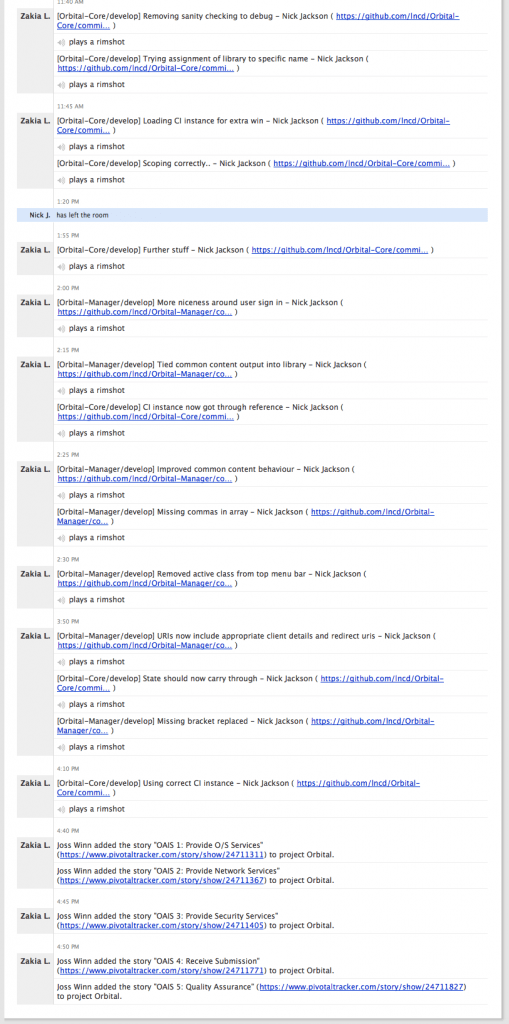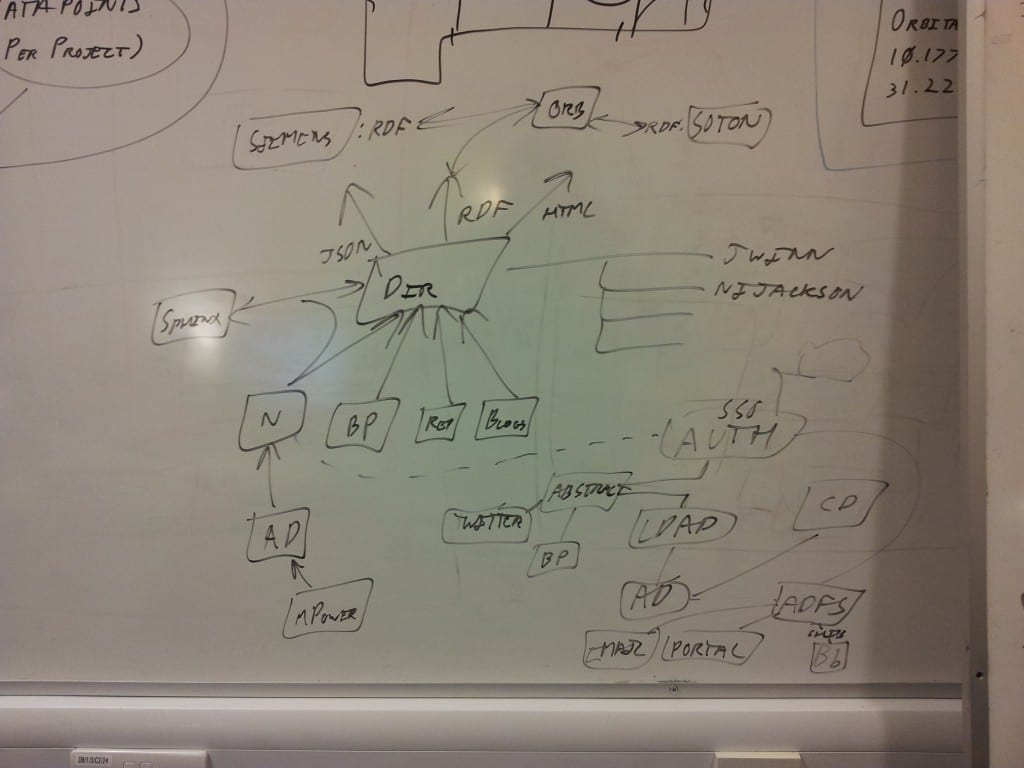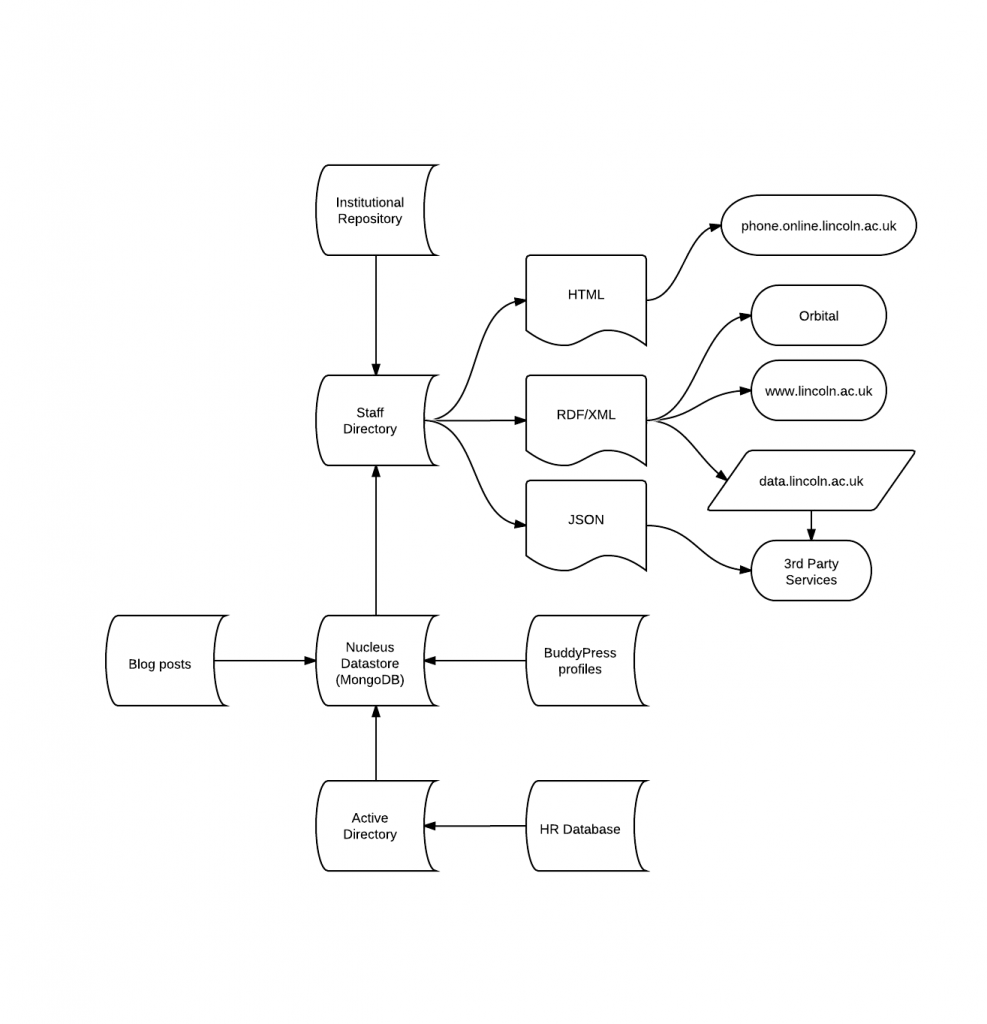Introduction
The Orbital Implementation Plan (WP6) is intended to be a synthesis of our initial user requirements gathering (WP5), an assessment of Engineering research data (WP9), an evaluation of standards and technologies (WP10), informed by a literature review of previous work relevant to the Research Data Management (RDM) domain as it relates the discipline of Engineering (WP4).
Therefore, appended to this Implementation Plan is: i) a Technical Specification based on user requirements; ii) a Literature Review; iii) a summary of an institution-wide survey based on the Data Asset Framework; iv) and a draft Research Data Management Policy for the University of Lincoln (WP7), which is currently under-going internal review.
The Implementation Plan has been written at exactly a third of the way into the Orbital project (six months), allowing for a further year of development based on the work brought together in this document. It is worth repeating the objectives of the project, as stated in the Project Plan:
We intend to build on our previous work around the deposit, management and access to university research as well as further existing work in which we are building a platform for data-driven services at the university.
Throughout this undertaking, we aim to improve our understanding of the issues around research data management; develop the requisite skills among the university community to better manage research data; re-use and develop some of the underlying tools we have built to provide an institution-wide service for the ingest, description, preservation and dissemination of research data; improve the way we work on such projects, refining our use of agile methods; build capacity for the local development of academic technologies at the university; develop and implement appropriate institutional policy for the deposit, management and sharing of research data; and develop a Business Plan for the university for the long-term sustainability of our research data.
Our work to-date has pursued many of these objectives closely, reflecting continued effort over the last six months, both inside and outside the project, to build on previous work by using institutional data to drive application development; to improve our methods of access and identity management; and develop an environment that fosters and supports in-house innovation.
This planning document is primarily intended to support the technical implementation of the Orbital application to manage research data at the University of Lincoln. What it does not address is the training to support the use of the application (WP11), nor the Business Case for sustaining the pilot service (WP13), which we are implementing. However, some preliminary work is underway to consider appropriate business models for sustaining Orbital as open source software and we believe that the technical decisions laid out in this Implementation Plan will support the development of a sustainable Business Case for Orbital. This area of work continues and the outcomes are due to be delivered towards the end of the project.
What follows is a brief summary of the appended Technical Specification and Literature Review. I would like to thank Nick Jackson and Paul Stainthorp for their work on these documents, which have brought clarity to the Orbital project and contributed to a much better understanding of RDM at the University of Lincoln.
Joss Winn, Orbital Project Manager, 2nd April 2012.
Literature Review
The management of research data is recognised as one of the most pressing challenges facing the higher education and research sectors. Research data generated by publicly-funded research is seen as a public good and should be available for verification and re-use. In recognition of this principle, all UK Research Councils require their grant holders to manage and retain their research data for re-use, unless there are specific and valid reasons not to do so. (JISC Managing Research Data Programme 2011-13).
To gain a clearer understanding of the more complex and unfamiliar concepts in the emerging discipline of Research Data Management, the Orbital project conducted a review of published literature on the subject (mainly web sites, project reports and guidance documents), with particular reference to RDM in the discipline of engineering.
An online Research Data Management bibliography is being maintained at: http://lncn.eu/bcf6
The project team identified the following nine themes in the literature – for each theme, a recommendation is made which will support the development of RDM infrastructure at the University of Lincoln.
1. Fundamentals of research data and RDM
Researchers are not a homogeneous group, and their data needs are changing as the research landscape becomes more complex. Recommendation: the Orbital project continue its work to assess the storage and other requirements of Lincoln researchers using surveys and interviews.
2. Particular requirements of the discipline of engineering
The ERIM (Engineering Research Information Management) project at the University of Bath has specified the first ever set of RDM principles and terminology designed specifically for engineers. Recommendation: the Orbital continue to work with the Bath team on implementing ERIM’s findings.
3. The behaviour of researchers
What motivates researchers to invest in RDM is not the same as what motivates their institutions. Recommendation: Orbital to use surveys and interviews to understand researchers’ requirements and develop appropriate advocacy materials.
4. RDM policies and legal aspects
All UK Research Councils are introducing mandates for data curation, and in some cases data publication. Recommendation: the Orbital team to support the University’s response to the imminently required EPSRC data policy roadmap and to help develop institutional policies.
5. Data sharing
Research data are at their most useful when they are interoperable with other data. Sharing data leads to a range of real and measurable benefits, and researchers’ interests are protected by a principle of ‘proprietary period’ of privileged access. Recommendation: Orbital work with Research & Enterprise to formulate clear policies on data sharing and licensing.
6. Costs and benefits
The most significant RDM costs for the institution occur at the data acquisition/ingest stage. Institutions that invest in RDM can expect significant benefits including new, unforeseen research activities made possible through the re-use and aggregation of data. Recommendation: Orbital provide guidance to researchers on ensuring RDM is costed into future research funding bids.
7. Curation standards, metadata and citation
Without a system for assigning citations to research data, further curation and sharing is impossible. Recommendation: Orbital incorporate the functionality of DataCite to allow Lincoln researchers to secure a DOI (Digital Object Identifier) for their data objects.
8. Technical considerations
The range of file formats involved in engineering research is a significant area of complexity. Recommendation: Orbital continue to work with Siemens, the School of Engineering, the University of Bath and the DCC to develop expertise in handling engineering data formats.
9. Tools, support and training
A range of immediately re-purposable RDM training kits and planning tools already exists. Recommendation: Orbital review the available material, and use them to design a RDM training programme for the University of Lincoln – also incorporate Data Management Planning (DMP) tools within the Orbital application.
In light of this, the initial objectives of the Orbital project were on the mark, but indicate a broad area of institutional responsibility that goes beyond scholarly communication to affect strategic areas such as recruitment and training, business intelligence and continuity, IP and income generation, as well as future curriculum design and our corresponding investment in infrastructure and estate. No small task.
Technical Approach
Our Project Plan outlined the technical approach that we originally anticipated and six months later this has not fundamentally changed. As detailed in the Technical Specification, we remain convinced of the benefits of pursuing a data-driven, API-centric model of development, using storage and access control methods that support the creation of a modular and scaleable web application that is attractive to both Users and Developers.
As we have learned from our requirements gathering and literature review, Research practices both within and across subject disciplines are varied, suggesting that over the next 12 months, the Orbital project should concentrate on developing an application that remains open and attractive to further development, rather than seeking to design a single workflow for all users’ needs – an impossible task.
We believe this approach best supports the sustained development of Orbital beyond the life of the pilot project, allowing both Researchers and software Developers to create applications for Orbital to suit the requirements of specific research disciplines at a given point in time. Likewise, an API-centric approach will also ensure that our existing and related applications, such as institutional repository software and research information systems can equally be treated as ‘users’ (producers and consumers) of Orbital.
As we outlined in our Project Plan, this approach allows us to benefit from work which continues outside the Orbital project such as that around Access and Identity Management and academic profiles, and the development of data.lincoln.ac.uk. It is also a suitable approach for the development of Orbital as open source software, which should remain simple to develop for specific user’s needs if it is to receive interest and contributions from developers outside the university.
The Technical Specification contains five core functional requirements: Projects, Workspace, Archives, Working Dataset, and Publication. A Project may result in a specific Publication(s), while the Workspace, Archives and Working Dataset allow for three non-sequential methods of data storage, manipulation and analysis. These requirements are loosely coupled to one another, but do not represent a publication workflow. Orbital is not simply intended to be a data repository, but the basis of a flexible collaborative environment for working Researchers.
Each Project acts as a conceptual container for all data and represents the ‘space’ in which administrative, descriptive and contextual metadata is captured and stored, as well as the datasets themselves. It is at the level of a Project that Orbital will interface with other systems, such as an institutional repository or research information system by storing, exchanging and publishing information according to recognised standards, such as CERIF, SWORD2, DOI, etc.
Finally, a core requirement from Orbital is that data should be stored, accessed and transported securely. Being a native web application, we have opted to implement the OAuth 2 protocol to provide secured access to all API functions over HTTPS. As such, all user applications will be treated equally and will be required to access the core Orbital APIs via this popular and mature standard for application authentication on the web. OAuth is increasingly being deployed at the University of Lincoln and work continues outside of the Orbital project to implement it as part of an institution-wide Single Sign On (SSO) architecture.
Related project blog posts
Chosen Methodology
Jenkins, build my software
Pivoting Around
Project Planning: Quality Assurance
Understanding and participating in open source culture
The Toolchain: First Pass
Tracking progress
Literature Review
An Orbital project reading list
Initial User Requirements
Meeting our users, the Engineers
Assessment of Data Sources
Research Data vs Research Data
Let’s Look At Data
Data, Data Everywhere
Gluing people together
Evaluation of standards and technologies
How the National Archives use MongoDB
Forecast: Cloudy
Piloting the cloud
Why Orbital is all about the API
Servers, Servers Everywhere
Eating your own dog food: Building a repository with API-driven development
Hello? Is it me you’re looking for?
Orbital and the OAIS reference model


